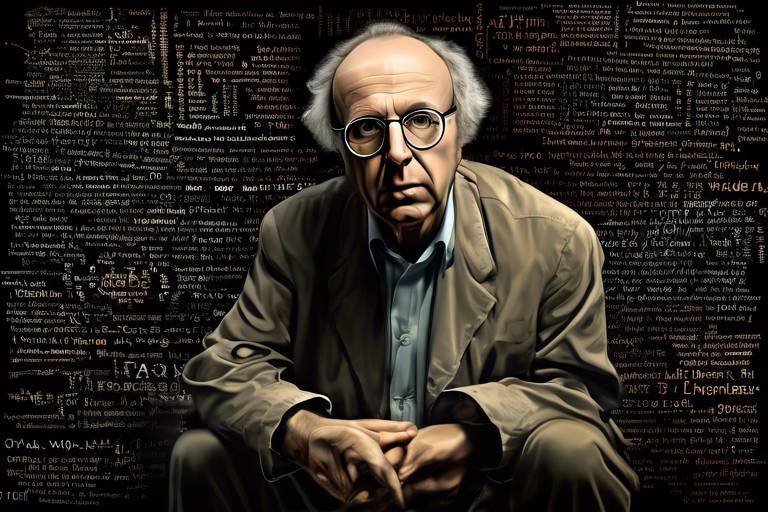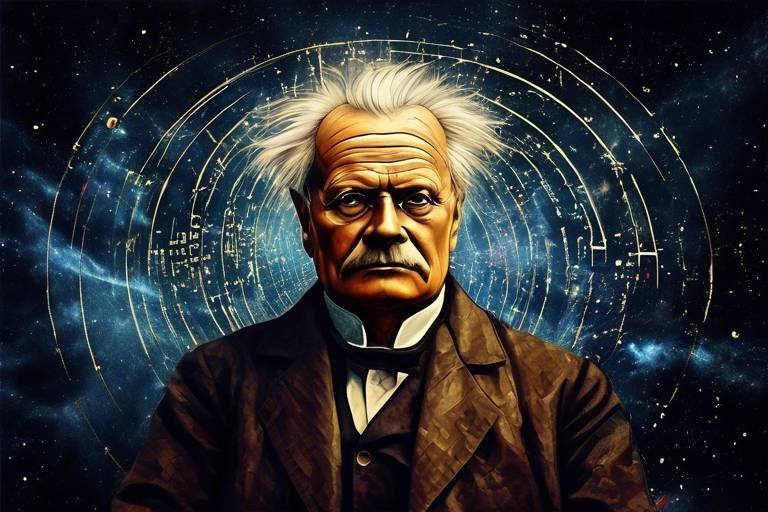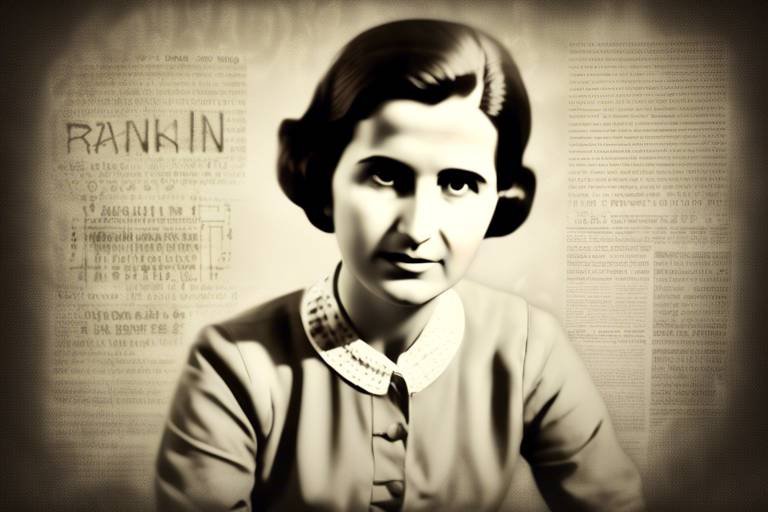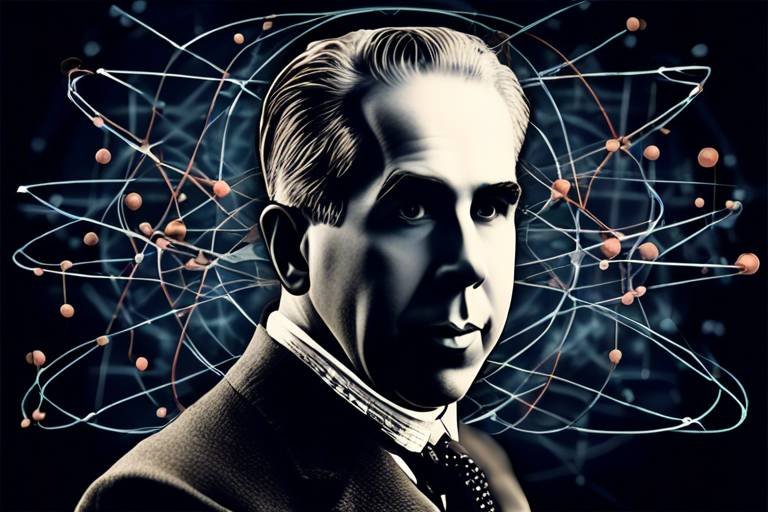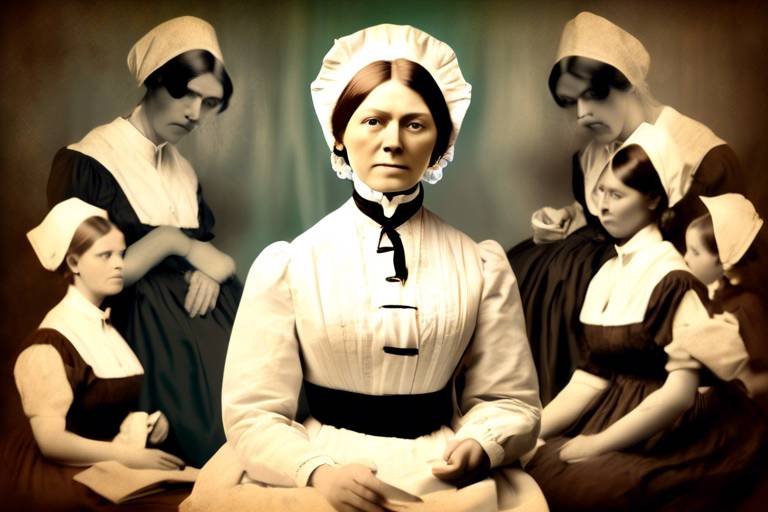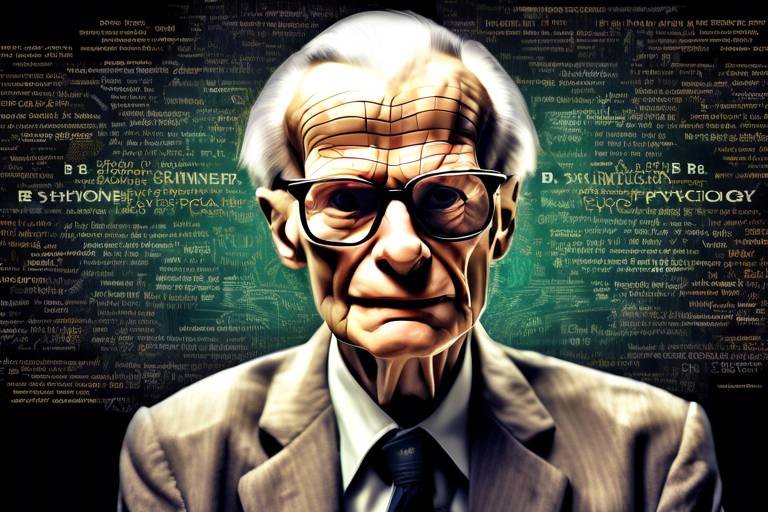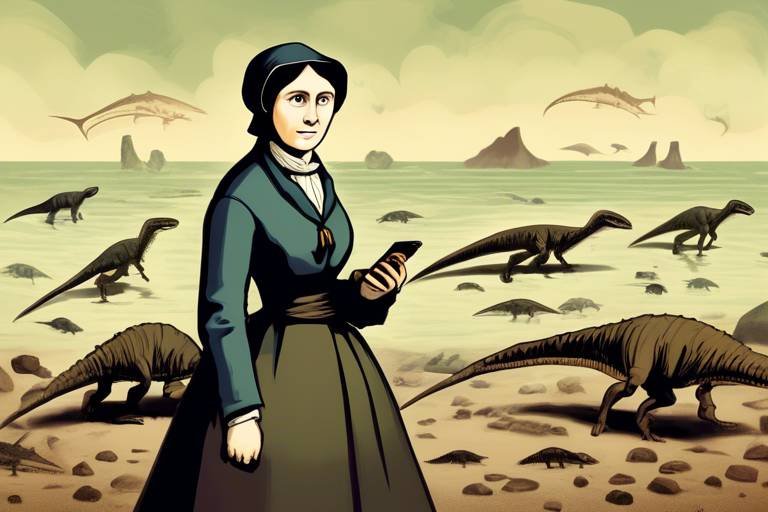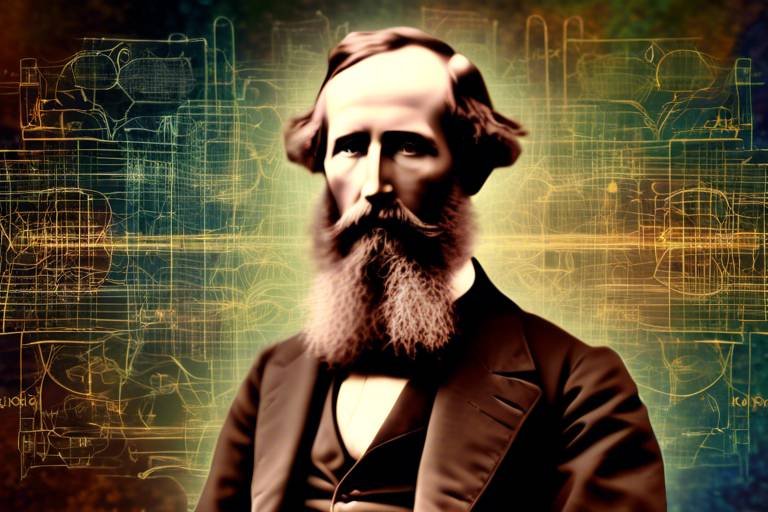The Discoveries of Louis Pasteur and Germ Theory
The story of Louis Pasteur is not just a tale of scientific achievement; it’s a thrilling journey that changed the course of medicine and public health forever. Imagine a world where diseases were thought to be caused by bad air or imbalances in bodily humors. Before Pasteur, the understanding of disease was shrouded in mystery, and the idea that tiny organisms could be the culprits was beyond the grasp of most. Pasteur’s groundbreaking work in the 19th century illuminated the dark corners of disease causation, paving the way for modern microbiology and drastically improving the health of populations worldwide.
Pasteur's research was driven by a simple yet profound question: What causes disease? His relentless pursuit of answers led him to discover that microorganisms, often invisible to the naked eye, played a crucial role in the spread of illnesses. This revelation was akin to flipping a light switch in a dark room; suddenly, everything became clearer. His findings not only transformed the scientific community's understanding of disease but also had practical implications that saved countless lives.
As we delve deeper into the life and work of Pasteur, we’ll explore how his discoveries laid the foundation for germ theory, a concept that revolutionized the way we approach health and hygiene. From the importance of sanitation to the development of vaccines, Pasteur's legacy is woven into the very fabric of modern medicine. So, let’s embark on this fascinating exploration of a man whose curiosity and innovation reshaped our understanding of the microscopic world.

The Early Life of Louis Pasteur
Louis Pasteur was born on December 27, 1822, in Dole, a small town in the Jura region of France. His early life was marked by a blend of humble beginnings and remarkable curiosity. Growing up in a family of tanners, Pasteur was not initially surrounded by the world of science, but his father, a former soldier, instilled in him a strong work ethic and a love for learning. As a young boy, he would often wander through the nearby countryside, observing nature and pondering the mysteries of life. This inquisitive spirit would later fuel his groundbreaking scientific endeavors.
Pasteur's formal education began in a local primary school, where he demonstrated exceptional talent in drawing and the sciences. His passion for learning led him to pursue higher education at the École Normale Supérieure in Paris, where he studied chemistry and physics. During his time there, he was profoundly influenced by prominent scientists of the day, including the renowned chemist Antoine Lavoisier. Pasteur's academic journey was not without challenges; he faced significant competition and initially struggled to find his footing in the scientific community. However, his perseverance paid off, and he graduated with a degree in sciences.
In the years that followed, Pasteur's career began to take shape. He accepted a position as a professor of chemistry at the University of Strasbourg, where he conducted research on crystallography. It was during this period that he made his first significant scientific contributions, particularly in understanding the asymmetry of certain molecules. This early work laid the groundwork for his later discoveries in microbiology. Pasteur's dedication to science was unwavering, and he often worked long hours in the lab, driven by an insatiable desire to uncover the secrets of the natural world.
As he delved deeper into the realm of science, Pasteur's interests began to shift towards the study of fermentation and the role of microorganisms. This transition was pivotal, as it would eventually lead him to challenge the prevailing beliefs of his time regarding the causes of disease. In a world where spontaneous generation was widely accepted, Pasteur's inquisitive nature and rigorous experimentation would set the stage for the revolutionary germ theory. His early life experiences, combined with his relentless pursuit of knowledge, shaped him into a scientist who would forever change the landscape of medicine and public health.
In summary, Louis Pasteur's formative years were characterized by a unique blend of curiosity, hard work, and a passion for science. His educational journey and early scientific endeavors not only equipped him with the skills necessary for his future discoveries but also instilled in him a profound respect for the scientific method. As we explore Pasteur's later contributions to microbiology and germ theory, it's essential to recognize how his early life experiences laid the foundation for a legacy that continues to impact the world today.

The Concept of Germ Theory
The concept of germ theory marks one of the most transformative shifts in our understanding of health and disease. Before Louis Pasteur and his contemporaries, many believed that diseases were caused by miasmas or "bad air." However, through rigorous experimentation and observation, Pasteur established that specific microorganisms were responsible for various diseases. This revolutionary idea reshaped the medical landscape, leading to a more scientific approach to health care.
At its core, germ theory posits that microorganisms, often too small to be seen without a microscope, are the primary agents of infection. Pasteur's meticulous studies demonstrated that these tiny entities could be isolated and identified as the culprits behind illnesses ranging from anthrax to rabies. His work laid the groundwork for a new understanding of pathogens, which are harmful microorganisms that can cause disease.
To further illustrate the importance of germ theory, consider the following key principles that emerged from Pasteur's findings:
- Microorganisms are ubiquitous: They exist everywhere—in the air, soil, and even on our skin. This realization changed how we viewed sanitation and hygiene.
- Infection can be prevented: By understanding the role of germs, it became possible to implement practices that could prevent infection, such as sterilization and vaccination.
- Specific germs cause specific diseases: This principle was groundbreaking, allowing for targeted treatments and preventive measures.
The implications of germ theory were profound. For instance, it led to the development of aseptic techniques in surgeries, which drastically reduced the risk of postoperative infections. Hospitals began to adopt stricter hygiene protocols, recognizing that cleanliness could save lives. Furthermore, the establishment of vaccination programs became a practical application of Pasteur's discoveries, offering a proactive approach to disease prevention.
In summary, germ theory not only transformed the field of microbiology but also had far-reaching effects on public health and medicine. By shifting the focus from the environment to the microorganisms themselves, Pasteur opened the door to understanding how diseases spread and how they could be controlled. This knowledge continues to influence medical practices and public health policies to this day, ensuring that the legacy of germ theory remains relevant in our fight against infectious diseases.

The Role of Microorganisms
Microorganisms, often invisible to the naked eye, are the unsung heroes and villains of our world. They are the tiny agents that play a colossal role in the ecosystem, influencing everything from the soil we walk on to the air we breathe. Louis Pasteur's groundbreaking work illuminated the intricate relationship between these microorganisms and human health, effectively turning the tide in our understanding of disease causation. Before Pasteur, the notion that tiny organisms could be responsible for illnesses was met with skepticism. However, through meticulous observation and experimentation, he unveiled a world teeming with life, fundamentally altering our approach to medicine and hygiene.
At the core of germ theory is the simple yet profound idea that many diseases are caused by microorganisms, including bacteria, viruses, fungi, and protozoa. Pasteur's research demonstrated that these tiny entities could invade the body, multiply, and cause infections. To illustrate this concept, consider the analogy of a house infested with pests. Just as a pest problem can lead to structural damage and health hazards, microorganisms can invade our bodies and lead to serious health issues. This revelation was nothing short of revolutionary, paving the way for advancements in sanitation and public health.
In his experiments, Pasteur identified specific microorganisms responsible for various diseases. For example, he discovered that the Bacillus anthracis bacterium was the causative agent of anthrax. His findings not only confirmed the existence of these pathogens but also emphasized the importance of hygiene and sanitation in preventing disease transmission. In fact, the relationship between microorganisms and diseases can be summarized in the following key points:
- Pathogenic Microorganisms: Some microorganisms are harmful and can cause diseases when they invade the body.
- Beneficial Microorganisms: Not all microorganisms are bad; many play crucial roles in processes like digestion and fermentation.
- Transmission: Understanding how these microorganisms spread is vital for controlling outbreaks and preventing diseases.
Pasteur's work also led to significant advancements in the understanding of infection control. By recognizing that microorganisms could be transmitted through various means—such as air, water, and direct contact—he laid the groundwork for practices that are now standard in hospitals and public health. His experiments on sterilization and pasteurization helped ensure that food and beverages were safe for consumption, drastically reducing the incidence of foodborne illnesses.
In summary, the role of microorganisms in germ theory is a fascinating tale of discovery that reshaped our understanding of health and disease. Louis Pasteur's pioneering work not only identified the harmful microorganisms that cause diseases but also highlighted the necessity of maintaining hygiene and sanitation to protect public health. His legacy continues to influence modern medicine and microbiology, reminding us that while these tiny organisms can be dangerous, they also play essential roles in our ecosystem.

Pasteur's Experiments with Fermentation
Louis Pasteur's groundbreaking experiments with fermentation marked a pivotal moment in the field of microbiology and laid the groundwork for our understanding of microbial processes. In the mid-19th century, Pasteur began investigating the mysterious processes that transformed sugar into alcohol, a phenomenon that had puzzled scientists for centuries. His research not only unveiled the role of microorganisms in fermentation but also debunked the long-held belief in spontaneous generation—the idea that life could arise from non-living matter.
To conduct his experiments, Pasteur meticulously designed a series of controlled studies. He observed that when yeast was present, fermentation occurred, producing alcohol and carbon dioxide. However, in the absence of yeast, no fermentation took place. This led him to conclude that microorganisms were essential for fermentation. One of his most famous experiments involved using swan-neck flasks, which allowed air to enter while preventing dust and microbes from contaminating the contents. This innovative setup demonstrated that microorganisms in the air were responsible for fermentation, not the air itself.
Through his experiments, Pasteur identified two distinct types of fermentation: alcoholic fermentation, primarily conducted by yeast, and lactic acid fermentation, carried out by bacteria. This discovery not only enhanced our understanding of the fermentation process but also had profound implications for various industries, such as brewing and winemaking. For instance, his findings led to the development of pasteurization, a process that involves heating liquids to kill harmful microbes while preserving flavor and quality. This technique revolutionized food safety and significantly reduced spoilage.
Moreover, Pasteur's work on fermentation provided crucial insights into the relationship between microorganisms and disease. He proposed that specific microbes were responsible for specific diseases, laying the foundation for the germ theory of disease. This connection between fermentation and disease prevention emphasized the importance of hygiene and sanitation in both food production and public health.
In summary, Pasteur's experiments with fermentation were not just about understanding how beverages were produced; they were a gateway to recognizing the vital role of microorganisms in our world. His innovative approach and rigorous scientific methods paved the way for advancements in microbiology, food safety, and public health, ultimately transforming how we perceive and manage microbial life.
- What was the significance of Pasteur's experiments with fermentation? Pasteur's experiments revealed the role of microorganisms in fermentation, leading to advancements in food preservation and hygiene.
- How did Pasteur's work influence modern medicine? His discoveries laid the foundation for germ theory, which revolutionized medical practices and public health policies.
- What is pasteurization? Pasteurization is a process developed by Louis Pasteur that involves heating liquids to kill harmful microbes while maintaining quality.

Pasteur and Vaccination
Louis Pasteur's contributions to the field of vaccination are nothing short of revolutionary. In an era when diseases like rabies and anthrax wreaked havoc on both animals and humans, Pasteur stepped into the spotlight with a vision that would change the course of medicine forever. His work not only laid the groundwork for immunology but also redefined how we approach disease prevention.
Pasteur's journey into vaccination began with his groundbreaking research on microbes. He discovered that certain microorganisms were responsible for diseases, which led him to the idea that exposing the body to a weakened form of a pathogen could stimulate the immune system to build defenses. This concept was radical at the time and was met with skepticism. However, Pasteur's determination and scientific rigor propelled him forward.
One of his most notable achievements was the development of the rabies vaccine. In the late 19th century, rabies was a death sentence, with no known cure. Pasteur meticulously crafted a vaccine using the spinal cords of infected rabbits, which he then attenuated (weakened) to create a safe yet effective inoculation. In 1885, he administered this vaccine to a young boy named Joseph Meister, who had been bitten by a rabid dog. The success of this treatment not only saved the boy's life but also marked a pivotal moment in medical history.
Furthermore, Pasteur's work extended to anthrax, a disease that plagued livestock and posed a significant threat to agriculture. In 1881, he conducted a daring public demonstration in which he vaccinated sheep against anthrax. The results were astonishing—those that received the vaccine remained healthy, while the unvaccinated fell ill. This experiment showcased the efficacy of vaccination and solidified Pasteur's reputation as a pioneer in the field.
Through these groundbreaking experiments, Pasteur established the principles of vaccination that continue to inform modern medical practices. His work demonstrated that vaccines could not only prevent diseases but also protect entire populations from outbreaks. The ripple effects of his discoveries are still felt today, as vaccination remains one of the most effective public health strategies available.
To summarize, Pasteur's innovative approach to vaccination transformed our understanding of disease prevention. His relentless pursuit of knowledge and unwavering commitment to public health have left an indelible mark on science and medicine. Today, we owe much of our progress in immunology and vaccination to his pioneering spirit. As we navigate the complexities of modern medicine, we can look back at Pasteur’s legacy with gratitude, knowing that his work has saved countless lives and continues to protect us from infectious diseases.
- What diseases did Pasteur develop vaccines for? Pasteur developed vaccines for rabies and anthrax, significantly reducing the incidence of these diseases.
- How did Pasteur's work influence modern vaccination practices? Pasteur's principles of using weakened pathogens to stimulate immunity laid the foundation for the development of vaccines we use today.
- Why is Pasteur considered a pioneer in immunology? His innovative techniques and successful experiments demonstrated the effectiveness of vaccination, establishing a new paradigm in disease prevention.

Public Health Implications
The discoveries made by Louis Pasteur had profound implications for public health, fundamentally altering how societies approached disease prevention and control. Before Pasteur's work, the prevailing belief was that diseases were caused by miasmas or "bad air." However, Pasteur's germ theory introduced a new paradigm, emphasizing that microorganisms were the true culprits behind many infectious diseases. This shift in understanding prompted a series of changes in public health policies and practices that resonate to this day.
One of the most significant outcomes of Pasteur's research was the promotion of sanitation and hygiene. As knowledge of germs spread, it became evident that cleanliness could prevent the spread of diseases. Governments and health organizations began to implement measures such as:
- Improving water quality and sewage systems
- Mandating handwashing in hospitals and clinics
- Establishing protocols for food safety and preservation
These initiatives not only reduced the incidence of infectious diseases but also fostered a culture of health awareness among the general public. People began to understand the importance of personal hygiene and sanitation, which contributed to a decline in mortality rates from diseases that were once rampant.
Moreover, Pasteur's work laid the groundwork for the development of vaccines, which became a cornerstone of public health. Vaccination campaigns have since eradicated or significantly reduced diseases like smallpox and polio, saving millions of lives worldwide. The ability to immunize populations against deadly infections has transformed public health strategies, allowing for the control of outbreaks before they escalate into epidemics.
In addition to vaccinations, Pasteur's findings encouraged the establishment of health regulations and surveillance systems to monitor and control infectious diseases. For instance, the formation of health departments and organizations, such as the World Health Organization (WHO), can be traced back to the need for coordinated public health responses based on scientific evidence. These entities work tirelessly to track disease outbreaks, promote vaccination, and educate the public on health practices.
As we reflect on the public health implications of Pasteur's discoveries, it's clear that his legacy extends beyond the laboratory. The principles of germ theory continue to inform our responses to health crises, including the recent COVID-19 pandemic. The emphasis on hygiene, vaccination, and scientific research remains crucial in safeguarding public health around the globe.
- What is germ theory? Germ theory is the scientific theory that microorganisms are the cause of many diseases.
- How did Pasteur's work impact vaccination? Pasteur developed vaccines for diseases like rabies and anthrax, establishing the foundation for modern immunology.
- What are some public health practices that emerged from germ theory? Practices include improved sanitation, vaccination programs, and health regulations to control infectious diseases.

The Legacy of Louis Pasteur
Louis Pasteur's legacy is nothing short of monumental, echoing through the halls of modern science and medicine. His groundbreaking discoveries laid the foundation for microbiology and have had a profound impact on public health practices around the world. Imagine a world where diseases spread unchecked, where the causes of ailments were shrouded in mystery; this was the reality before Pasteur's contributions. His work not only unveiled the hidden world of microorganisms but also changed the way we perceive and combat diseases.
One of the most significant aspects of Pasteur's legacy is his pioneering research in the field of vaccination. By developing vaccines for rabies and anthrax, he introduced a new era in disease prevention. His innovative approach demonstrated that exposure to a weakened form of a pathogen could stimulate the immune system, leading to immunity against future infections. This principle laid the groundwork for the vast field of immunology, which continues to save millions of lives today.
Furthermore, Pasteur's findings on fermentation and pasteurization revolutionized food safety and preservation. The process of heating liquids to kill harmful microbes not only improved the quality of food products but also significantly reduced the risk of foodborne illnesses. Imagine enjoying a glass of milk or a bottle of wine, knowing that the risk of illness has been dramatically lowered thanks to Pasteur's methods. His work in this area has become a cornerstone of modern food safety protocols.
The implications of Pasteur's research extended beyond individual health. His discoveries influenced public health policies, leading to improved sanitation practices and disease control measures. Governments and health organizations around the globe adopted his principles, which contributed to the decline of infectious diseases. For instance, the establishment of sanitation systems and vaccination programs can be traced back to the principles he championed.
To illustrate the impact of Pasteur's legacy, consider the following table that summarizes some of his key contributions:
| Contribution | Impact |
|---|---|
| Germ Theory | Revolutionized understanding of disease causation. |
| Vaccination | Laid groundwork for immunology and disease prevention. |
| Pasteurization | Improved food safety and reduced foodborne illnesses. |
| Microbiology | Established microbiology as a scientific discipline. |
Moreover, Pasteur's influence stretches into the realm of education and research. He inspired countless scientists to explore the microbial world, leading to significant advancements in medical science. His legacy serves as a reminder of the importance of scientific inquiry and the relentless pursuit of knowledge. Without his contributions, many of the medical breakthroughs we take for granted today may never have occurred.
In summary, Louis Pasteur's legacy is a testament to the power of scientific discovery. His work not only transformed our understanding of diseases but also shaped the very foundations of modern medicine and public health. As we continue to navigate challenges in healthcare, the principles he established remain relevant and essential. In a world where new pathogens emerge, the importance of Pasteur's discoveries is perhaps more critical than ever.
- What is germ theory? Germ theory is the scientific understanding that many diseases are caused by microorganisms.
- How did Pasteur contribute to vaccination? Pasteur developed vaccines for rabies and anthrax, demonstrating how weakened pathogens can provide immunity.
- What is pasteurization? Pasteurization is a process that heats liquids to kill harmful microbes, improving food safety.
- Why is Pasteur considered the father of microbiology? His discoveries laid the groundwork for the field of microbiology, establishing it as a scientific discipline.

Influence on Future Scientists
Louis Pasteur's groundbreaking work in microbiology and germ theory not only transformed the medical field during his lifetime but also laid a solid foundation for future generations of scientists. His innovative experiments and discoveries ignited a spark of curiosity and ambition among researchers who followed in his footsteps. Imagine a world where the invisible enemies causing diseases were finally being recognized and understood—this was the reality that Pasteur helped create, and it inspired countless scientists to dive deeper into the mysteries of microbes.
One of the most significant ways Pasteur influenced future scientists was through his meticulous approach to experimentation. He demonstrated the importance of the scientific method, emphasizing the need for rigorous testing and observation. His famous swan-neck flask experiment, which debunked the theory of spontaneous generation, is a prime example. By showing that microorganisms in the air were responsible for contamination, he encouraged scientists to question established beliefs and seek evidence-based answers. This shift in perspective was crucial for the development of microbiology as a discipline.
Moreover, Pasteur's work on vaccinations paved the way for immunology, inspiring researchers like Edward Jenner, who had previously developed the smallpox vaccine. Pasteur's approach to vaccination—using weakened forms of pathogens to stimulate the immune response—opened the door for future vaccine development. Scientists such as Albert Calmette and Camille Guérin, who created the BCG vaccine for tuberculosis, built upon Pasteur's principles, showcasing the lasting impact of his work.
As we look at the modern landscape of science, it’s clear that Pasteur’s influence permeates various fields. His emphasis on hygiene and sanitation led to improved laboratory practices, which are essential in research today. The principles he established are still taught in academic institutions worldwide, shaping the minds of new scientists who will carry on his legacy. For instance, many contemporary microbiologists and epidemiologists reference Pasteur's findings when studying infectious diseases and developing strategies to combat them.
To illustrate Pasteur's influence, consider the following table that highlights key scientists who were inspired by his work:
| Scientist | Contribution | Connection to Pasteur |
|---|---|---|
| Edward Jenner | Developed the smallpox vaccine | First to use vaccination principles; influenced by Pasteur's work on immunology |
| Albert Calmette | Developed BCG vaccine for tuberculosis | Built on Pasteur's vaccination techniques |
| Robert Koch | Identified causative agents of diseases (e.g., anthrax, tuberculosis) | Followed Pasteur's methods in disease research |
In essence, Pasteur's influence on future scientists is a testament to the power of curiosity and rigorous scientific inquiry. His legacy is not confined to the 19th century; it continues to inspire and guide researchers in their quest to understand the microscopic world. The ripple effect of his discoveries can be seen in the ongoing efforts to combat infectious diseases, develop new vaccines, and improve public health globally. Future scientists owe much to Pasteur, as he not only changed the course of medical history but also instilled a sense of wonder and responsibility in the pursuit of knowledge.
- What is germ theory? Germ theory is the scientific principle that microorganisms are the cause of many diseases.
- How did Pasteur's work influence modern medicine? Pasteur's discoveries led to the development of vaccines and improved hygiene practices, which have significantly reduced the spread of infectious diseases.
- Who were some of Pasteur's contemporaries? Notable contemporaries include Robert Koch, who further developed germ theory, and Edward Jenner, known for the smallpox vaccine.
- What is the significance of Pasteur's swan-neck flask experiment? This experiment demonstrated that microorganisms in the air can contaminate sterile solutions, debunking the theory of spontaneous generation.

Modern Applications of Germ Theory
Germ theory, a revolutionary concept introduced by Louis Pasteur, remains a cornerstone of modern medicine and public health. Its principles are not just historical footnotes; they are actively applied in various fields today. From the way we handle infectious diseases to the protocols we follow in hospitals, the impact of germ theory is profound and far-reaching. Imagine a world where diseases spread unchecked, where the concept of hygiene is merely an afterthought. Thanks to Pasteur's groundbreaking work, that world is a distant memory.
One of the most significant applications of germ theory is in the field of infection control. Hospitals and healthcare facilities now implement strict hygiene protocols to minimize the risk of hospital-acquired infections. These protocols include:
- Regular handwashing and the use of sanitizers.
- Sterilization of medical equipment.
- Isolation of infected patients to prevent the spread of pathogens.
These practices are vital in protecting patients, especially those with weakened immune systems. The understanding that microorganisms can cause disease has led to the development of comprehensive infection control measures that save countless lives.
Another critical application is in the development of antibiotics. The discovery of penicillin by Alexander Fleming was built upon the foundational principles of germ theory. Today, antibiotics are prescribed to combat bacterial infections, but their effectiveness hinges on the understanding of how bacteria operate and reproduce. This knowledge allows healthcare providers to choose the right antibiotic for the right infection, tailoring treatments based on the specific pathogens involved. However, the rise of antibiotic resistance poses a significant challenge, reminding us of the ongoing relevance of Pasteur's work in combating microbial threats.
Moreover, germ theory has transformed public health strategies globally. Vaccination programs, which were pioneered by Pasteur himself, are now a critical component of disease prevention. Vaccines stimulate the immune system to recognize and fight specific pathogens, effectively preventing outbreaks of diseases like measles, polio, and influenza. The recent global response to the COVID-19 pandemic showcased the importance of vaccines and public health measures rooted in germ theory. Mass vaccination campaigns, contact tracing, and public awareness initiatives all stem from the understanding that controlling the spread of germs can save lives.
In addition to vaccines, germ theory informs our approach to food safety. The principles of sanitation and hygiene in food production and preparation are grounded in Pasteur's discoveries. Regulations that require proper food handling, cooking, and storage are designed to prevent foodborne illnesses caused by pathogens. The implementation of Hazard Analysis Critical Control Point (HACCP) systems in food industries is a direct application of germ theory, ensuring that potential hazards are identified and controlled.
As we look to the future, the applications of germ theory continue to evolve. Research in microbiomes—the communities of microorganisms living in and on our bodies—has opened new avenues for understanding health and disease. By recognizing the complex interactions between our bodies and these microorganisms, scientists are exploring how to harness beneficial microbes to promote health and combat diseases.
In conclusion, the modern applications of germ theory are vast and varied, influencing everything from hospital protocols to global vaccination efforts. As we navigate new challenges in public health, the principles established by Louis Pasteur remain more relevant than ever, guiding our efforts to protect and enhance human health in an ever-changing world.
1. What is germ theory?
Germ theory is the scientific theory that microorganisms, or germs, are the cause of many diseases. It was developed in the 19th century, primarily through the work of Louis Pasteur and Robert Koch.
2. How has germ theory influenced modern medicine?
Germ theory has led to significant advancements in hygiene, sanitation, vaccination, and the development of antibiotics, fundamentally transforming medical practices and public health policies.
3. What role do vaccines play in germ theory?
Vaccines are designed to stimulate the immune system to recognize and combat specific pathogens, effectively preventing diseases that are caused by germs.
4. Why is infection control important in hospitals?
Infection control measures are crucial in hospitals to prevent the spread of infections, especially among vulnerable patients, thereby saving lives and reducing healthcare costs.
5. What challenges does germ theory face today?
One of the major challenges is antibiotic resistance, where bacteria evolve to resist the effects of medications, making infections harder to treat and control.
Frequently Asked Questions
- What were the major contributions of Louis Pasteur to microbiology?
Louis Pasteur made groundbreaking contributions to microbiology, including the development of the germ theory of disease. He demonstrated that microorganisms are responsible for fermentation and spoilage, which led to significant advancements in food safety and preservation. His work laid the foundation for the field of microbiology and transformed our understanding of how diseases are caused.
- How did Pasteur's experiments change the perception of germs?
Before Pasteur's experiments, many believed that diseases were caused by miasma or "bad air." Pasteur's research provided clear evidence that specific microorganisms lead to specific diseases. This shift in understanding not only changed the way scientists viewed germs but also revolutionized medical practices, leading to improved hygiene and sanitation measures.
- What is germ theory and why is it important?
Germ theory is the scientific principle that microorganisms are the cause of many diseases. It is crucial because it changed the approach to medicine and public health. By understanding that germs can cause illness, healthcare practices evolved to include sterilization, vaccination, and more effective disease prevention strategies, ultimately saving countless lives.
- What role did Pasteur play in the development of vaccines?
Louis Pasteur was a pioneer in the field of immunology. He developed the first vaccines for rabies and anthrax, showcasing his innovative approach to disease prevention. His work demonstrated that exposure to weakened forms of a pathogen could stimulate the immune system to fight off future infections, laying the groundwork for modern vaccination practices.
- How did Pasteur's discoveries impact public health policies?
Pasteur's discoveries had a profound impact on public health policies by emphasizing the importance of sanitation and hygiene. His work led to the implementation of better sanitation practices in hospitals and communities, significantly reducing the spread of infectious diseases and improving overall public health outcomes.
- What is the legacy of Louis Pasteur in modern science?
Louis Pasteur's legacy endures in modern science through his contributions to microbiology and immunology. His principles continue to guide research and practices in infection control, antibiotic development, and public health strategies, making him a foundational figure in the fight against infectious diseases.
- How does germ theory apply to contemporary medicine?
Germ theory remains highly relevant in contemporary medicine. It informs practices such as infection control in healthcare settings, the development of antibiotics, and ongoing public health initiatives aimed at preventing outbreaks. Understanding germs and their role in disease is crucial for effective medical treatment and public health responses today.


